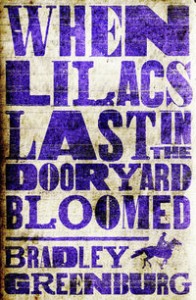 Published by Sandstone Press 19 June 2014
Published by Sandstone Press 19 June 2014
342pp, paperback, £8.99
Reviewed by Shirley Whiteside
With its title taken from a Walt Whitman poem, Bradley Greenburg’s debut is a rich exploration of the relationships between fathers and sons set in an America where some people, no matter what President Lincoln might say, will never get used to the idea that humans cannot be owned, sold or traded.
With the Civil War finally over, many black Americans find that freedom from slavery doesn’t always make for a better life. In an attempt to break free of the past, young Clayton McGhee and his family leave the South behind and move to Indiana, buying a farm and using their skills as master carpenters to renovate it. It is a hard but good life and the McGhee family thrive, careful to keep to themselves as much as possible. However some white people just can’t bear to see a black family doing well and trouble is never far away. When it finally arrives, young Clayton finds himself at the centre of the action. The choice he makes on that fateful day will come back to haunt him as an adult with a family of his own to care for.
Greenburg’s evocation of life just after the Civil War is fascinating, with some black people, like the McGhee family, embracing their new-found freedom while others struggle to cope without the certainties of slavery. For them, it really is ‘better the devil you know’. The story is told through young Clayton’s eyes. The pride that his father James and grandfather Amos take in their woodworking skill is well drawn as they teach Clayton to follow in their footsteps, although the projects are described in exhaustive detail which becomes a little overwhelming and stalls the action somewhat. However the metaphor of the men crafting a fine new life out of rough wood is successful. The male characters are more rounded than the female characters, such as Clayton’s mother and grandmother, but there is enough meat on their bones to make them interesting.
The second part of the novel features the adult Clayton but there is so much ‘telling’ rather than ‘showing’ that he becomes more distant and unknowable. There is also a lack of dialogue throughout which is often no bad thing but in this case a little more dialogue would add a stronger flavour of Clayton’s character and background.
This is an ambitious debut but Greenburg handles his material well, not letting his research overwhelm the drama. In the young Clayton in particular he has fashioned a sympathetic character who carries the first part of the novel well. It is a period of history that deserves to be better known, and no doubt there is much more to be written about it, but Greenburg’s tale of the McGhee family is an appealing read.
